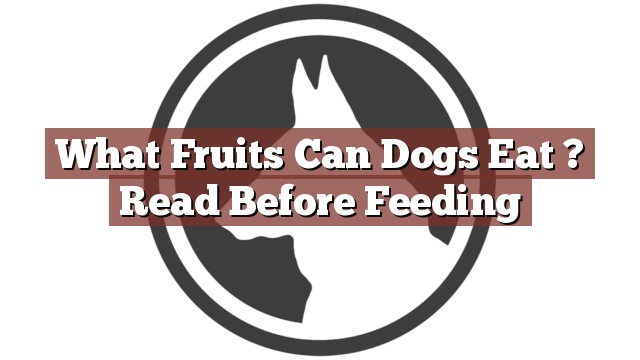Understanding Your Dog’s Dietary Needs
As a responsible pet owner, it is essential to understand your dog’s dietary needs to ensure their overall health and well-being. While dogs are primarily carnivorous animals, they can also benefit from certain fruits in their diet. However, it is crucial to note that not all fruits are safe for dogs to consume. Before you introduce any new food into your dog’s diet, it is vital to do your research and consult with your veterinarian to ensure it is safe and appropriate for your furry friend.
What Fruits Can Dogs Eat? Read Before Feeding
Now, the question arises, "What fruits can dogs eat?" Let’s explore some fruits that are safe and can be a healthy addition to your dog’s diet:
-
Apples: Yes, dogs can eat apples! They are an excellent source of vitamins A and C, as well as dietary fiber. However, remember to remove the seeds and core, as they can be a choking hazard.
-
Bananas: Absolutely! Bananas are a great source of potassium, vitamin C, and vitamin B6. They make for a tasty and healthy treat for your furry companion.
-
Blueberries: Yes, dogs can enjoy the sweet and nutritious taste of blueberries. They are packed with antioxidants and provide various health benefits.
-
Watermelon: The answer is a big YES! Watermelon is a hydrating and refreshing treat for dogs. However, remember to remove the seeds and rind before feeding it to your furry friend.
-
Strawberries: Dogs can safely enjoy strawberries, which are rich in fiber, vitamin C, and antioxidants. Just make sure to remove the leaves and stems before offering them to your dog.
Pros and Cons of Feeding Fruits to Dogs
Feeding fruits to dogs can have several advantages and disadvantages that every pet owner should be aware of:
Pros:
-
Nutritional Benefits: Many fruits are rich in essential vitamins, minerals, and antioxidants that can boost your dog’s overall health.
-
Hydration: Fruits with high water content, like watermelon, can help keep your dog hydrated, especially during hot summer months.
-
Natural Treats: Fruits can serve as a healthy and natural alternative to processed treats and snacks, promoting weight management.
Cons:
-
Allergies: Some dogs may be allergic to certain fruits, so it’s crucial to introduce new fruits gradually while monitoring any adverse reactions.
-
Digestive Upset: Feeding too much fruit at once can cause digestive issues like diarrhea or upset stomach in some dogs. Therefore, moderation is key.
Conclusion
In conclusion, dogs can eat a variety of fruits, but it’s essential to choose the right ones and feed them in moderation. Apples, bananas, blueberries, watermelon, and strawberries are among the many safe options. However, always remember to remove any harmful parts such as seeds, stems, or rinds. While fruits can offer nutritional benefits and serve as healthy treats, it is always recommended to consult with your veterinarian before introducing any new food to your dog’s diet. By being mindful of your dog’s dietary needs, you can ensure their health and happiness for years to come.
Thank you for taking the time to read through our exploration of [page_title]. As every dog lover knows, our furry friends have unique dietary needs and responses, often varying from one canine to another. This is why it's paramount to approach any changes in their diet with caution and knowledge.
Before introducing any new treats or making alterations to your dog's diet based on our insights, it's crucial to consult with a veterinarian about [page_title]. Their expertise ensures that the choices you make are well-suited to your particular pet's health and well-being.
Even seemingly harmless foods can sometimes lead to allergic reactions or digestive issues, which is why monitoring your dog after introducing any new food item is essential.
The content provided here on [page_title] is crafted with care, thorough research, and a genuine love for dogs. Nevertheless, it serves as a general guideline and should not be considered a substitute for professional veterinary advice.
Always prioritize the expert insights of your veterinarian, and remember that the health and happiness of your furry companion come first.
May your journey with your pet continue to be filled with joy, love, and safe culinary adventures. Happy reading, and even happier snacking for your canine friend!

